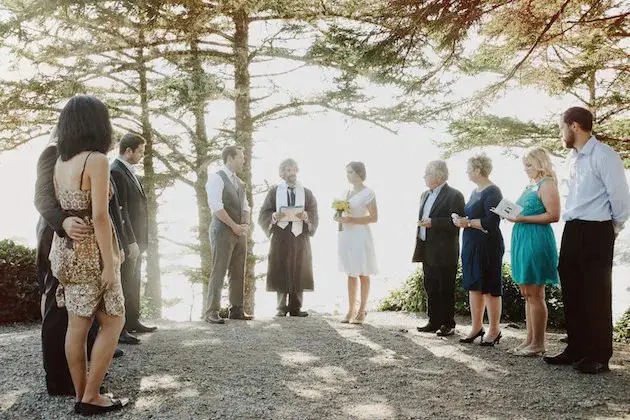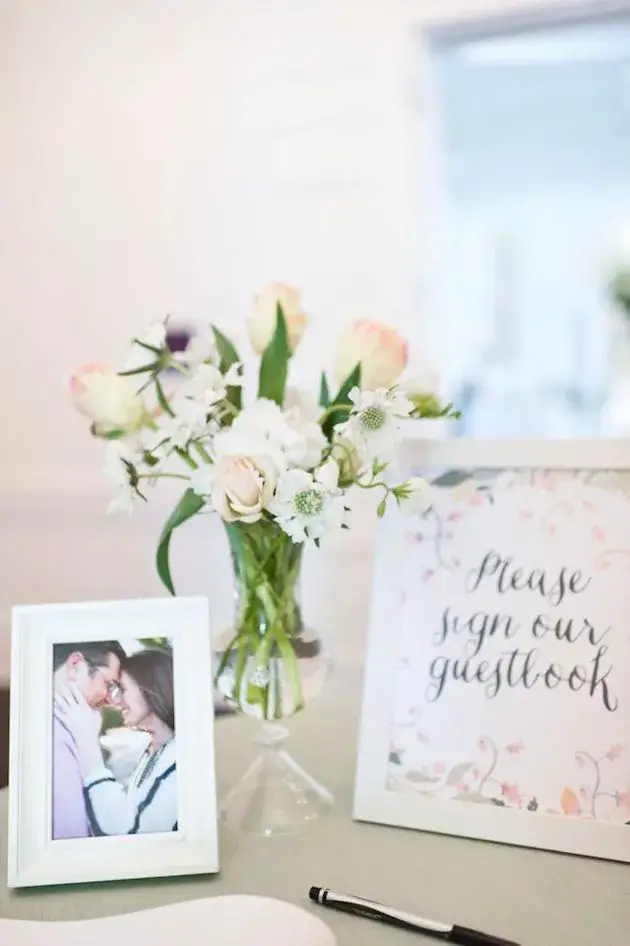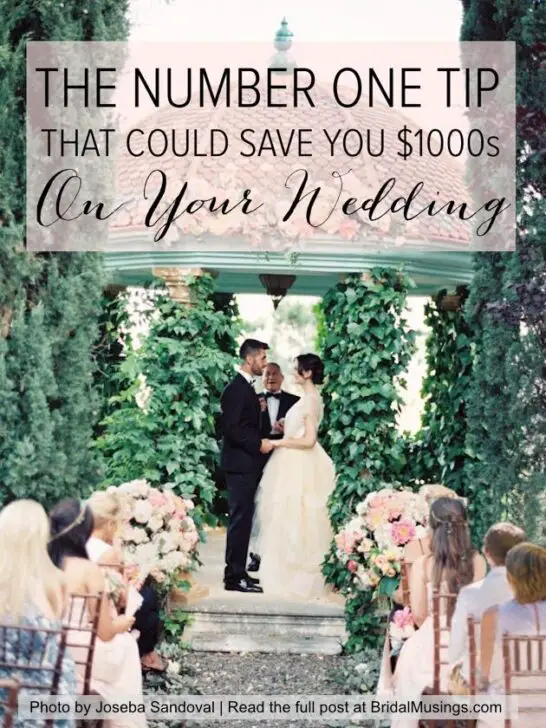
There is no magic formula for securing automatic vendor discounts or finding affordable wedding decor. The only tried-and-true method for saving significantly on your special day is by making a crucial decision: trimming the guest list. It’s not a popular solution, but it’s a necessary one.Some couples are unwilling to compromise on their guest count, even if it means sacrificing other important elements of their wedding. If this describes you, there are ways to make adjustments that won’t be noticed by your guests.When planning a wedding, priorities must be set. For some, great food, excellent entertainment, or an intimate atmosphere take top billing. In these cases, finding room in the budget elsewhere is necessary.The guest list is where many couples can cut costs without sacrificing their wedding vision. Some expenses, such as the dress, photographer, and entertainment, remain unchanged regardless of the number of guests invited. However, every added guest (and potential plus one) can add hundreds of dollars to the total cost of your wedding when it comes to decor, catering, stationery, and venue choice.While it may be unpleasant to consider the financial implications for your friends and family, the reality is that there are only so many dollars to stretch before you must start crunching numbers. Whether you have a big budget or a small one, making this difficult decision can ultimately lead to a more affordable and stress-free wedding.
12 Ways To Cut Back on Your Wedding Guestlist

When it comes to trimming down the guest list, it’s no surprise that it can be a major source of anxiety and sleepless nights for newlyweds. However, by adopting a strategic approach, you can make the process less daunting. Start by having an open conversation with your partner about dividing up the guests 50/50 or allocating more to one side, if needed. This may not be the most comfortable discussion, but it’s crucial in avoiding potential conflicts and hard feelings down the line. Once you’ve settled on a split, categorize your guests into groups based on how you know them. This can help you make more targeted cuts and minimize hurt feelings among certain friend circles. Ideally, aim to only invite people who are familiar with both you and your partner as a couple. Meeting unfamiliar faces on your wedding day can be overwhelming, to say the least. Ultimately, prioritize inviting those you truly want to share this special moment with, rather than feeling obligated to include others. This may seem like an obvious tip, but it’s surprising how many couples compromise their own desires for the sake of duty.
No One Will Be Annoyed That You Didn’t Ask Them (And If They Are, They Shouldn’t Have Been Invited Anyway)

When creating your guest list, it’s crucial to consider the emotions involved to avoid feelings of guilt and anxiety. As you deliberate, ask yourself if there’s anyone who would offend or upset you if they declined your invitation. Probably not, unless perhaps it’s a sibling. If someone is capable of being angry with you for not attending their wedding due to budget constraints, that’s a different story altogether. Similarly, when deciding whether to invite someone to your own celebration, consider the precedent set by party invites in general – no one expects reciprocity or assumes an invitation to be a condition of attendance. If you’ve received an invitation to someone else’s event and feel guilty about not being able to return it, remember that the initial gesture was intended as a kind act, not a quid pro quo.
The A List

While creating an A-list, B-list, and C-list of attendees might not be the most enjoyable task, it’s a crucial step in planning your wedding guestlist. The A-list comprises individuals you simply cannot imagine celebrating your special day without. For some couples, this may include 10 close friends and family members, while for others, it could mean inviting up to 40 people who hold a special place in their hearts. By prioritizing these essential guests and viewing everyone else as an added bonus, you can approach the task with a more positive outlook.
Cousin Cutbacks

Photos of childhood memories with cousins often evoke nostalgia and warmth, but as adults, our relationships with them may have drifted apart over time. Perhaps it’s been 20+ years since we’ve spent quality time together, sharing experiences that now seem like a distant memory – camping trips, birthday parties, and sleepovers. Fast forward to the present, and you’re faced with the daunting task of crafting your wedding guestlist. While family gatherings are always special, there’s no need to feel pressured into inviting every cousin, their partner, and their offspring. The good news is that it’s a simple way to streamline your guestlist and avoid feeling overwhelmed by the sheer number of relatives.
Think of the Children

Weddings are often a time when families come together, and children can be a significant part of that. However, it’s also common for couples to want to make their special day an adults-only affair. This can be especially true if the wedding is being held at a venue with limited space or amenities that might not be suitable for young children.Of course, you’ll always want your own kids and close family members to be there to celebrate with you. But when it comes to other guests’ little ones, it’s perfectly fine to set boundaries. After all, grown-ups deserve a break from diaper changes and tantrums too! It’s not uncommon for parents to appreciate the chance to let their hair down and enjoy some kid-free time.Ultimately, whether or not to allow children at your wedding is up to you and your partner. You can choose to make it a family-friendly event, or keep it an adults-only affair. Just be sure to communicate your decision clearly with your guests so they know what to expect.
Work Colleague Wedding Guests

With wedding planning underway, the lines between personal and professional relationships can become blurred. Your work colleagues have been a constant presence in your life, sharing in your excitement as you prepare for your big day. They’ve celebrated with you over champagne toasts and comforted you during stressful moments. But as the guest list comes into focus, it’s natural to wonder how to balance the needs of your office friends with those of your closer relationships. Unless you have a small, tight-knit group at work, making decisions about who to invite can feel overwhelming. In many cases, an all-or-nothing approach is easier to adopt, and this often means cutting ties with colleagues. However, if you’re getting married in the same location as your workplace or have friends who are also part of your office social circle, consider inviting them to a post-dinner celebration or after-party. This way, you can still include them in your special day without feeling like you’re sacrificing other relationships.
Your Parents’ Pals

When it comes to managing expectations around your wedding guest list, one common hurdle arises when parents are footing the bill – but you and your partner are expected to foot the rest. This can be a delicate situation, as parents may feel entitled to decide who gets an invitation. However, it’s crucial to have an open conversation with them about the guest list. After all, if you’re covering part of the expenses yourself, you’ll likely need to make some tough decisions about who to invite and who to leave off. In this case, consider framing the discussion around shared responsibility. You’ve had to be selective in your own guest choices, so they should understand that their choices will also have limitations.
All Your Old Friends

As couples prepare for their special day, it’s natural to feel a strong sense of nostalgia and tradition surrounding weddings. However, this can sometimes make it difficult to stay present in the moment, especially when reminiscing about old times with friends from the past. While it’s lovely to reconnect with old friends who still play an important role in your life, there are certainly instances where you might not feel the need to extend an invitation to someone you haven’t spoken to in several years. This is particularly true if that time lapse has been longer than the duration of your relationship with your partner.In these situations, it’s essential to prioritize your own happiness and remember that liking a friend’s Facebook status update doesn’t necessarily equate to meaningful communication. Ultimately, your wedding day should be celebrated with those who are most important to you in the present.
All Your New Friends

As I scroll through social media feeds, I’m reminded of a peculiar phenomenon that often accompanies the wedding planning process: an awkwardness when it comes to forming new friendships. The fear of being perceived as desperate or increasing one’s social circle can lead individuals to hesitate in pursuing connections with others. A friend of mine confided in me about her reluctance to form meaningful relationships during her engagement, echoing a sentiment that I’ve encountered before. It’s almost as if there’s an unspoken rule to maintain a certain level of acquaintanceship without crossing the threshold into true friendship. Of course, this approach has its advantages – someone who hasn’t been part of your inner circle won’t be hurt if they’re not invited to the wedding. Moreover, you can always welcome them into your life at a later time, once the dust settles.
Remember The Plus Ones

As couples and relationships come in all shapes and sizes, so too do the rules surrounding guest lists. While some may argue that long-term partners and those engaged or married should be allowed a plus one, others might say that it’s unfair to leave singles without an accompanying date. In reality, there’s no one-size-fits-all solution. A practical approach is to group single friends together, allowing them to mingle without the pressure of finding dates for each other. On the flip side, colleagues and work acquaintances can bring their colleagues along, sans significant others. However, it’s also important to consider those who may be attending solo, as they often lack a built-in social network at the wedding. In these cases, a dance partner might be in order, ensuring that everyone has an enjoyable experience.
Consider a Destination

While destination weddings are often perceived as exclusive or costly, the reality is that couples choose this option for numerous reasons. It’s unfair to assume that a reduced guest list is the primary motivation. In fact, having a destination wedding can actually simplify the process of managing your guest count. When you’re asking guests to travel, it’s naturally easier to set boundaries and maintain a smaller, more intimate gathering. While it’s not advisable to plan a destination wedding solely for this reason, it can be a practical solution if you’re struggling to trim your list. Family pressure, etiquette considerations, or personal obligations may also influence your decision. Ultimately, a well-planned destination wedding can provide the perfect setting for an unforgettable celebration.

